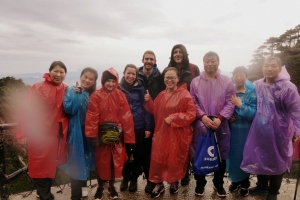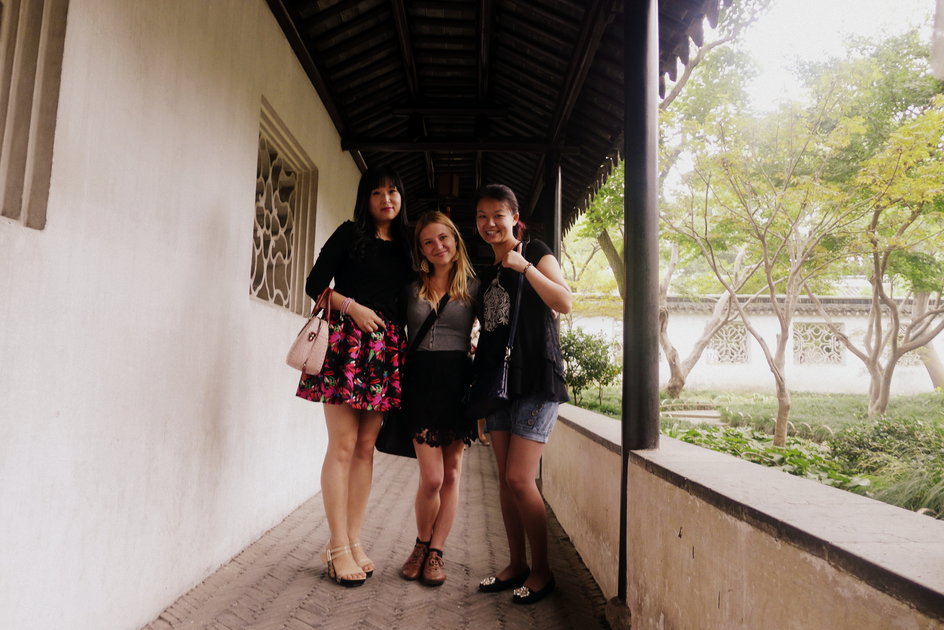By Fabienne King, Teacher in Suzhou (2015-2016)
‘Wàiguórén’ is the Chinese word for foreigner and this alongside variations such as ‘wàiguólaoshi’ and ‘lǎowài’ could often be heard as I entered rooms, buses, or left the school I worked at. In China being a foreigner makes you stand out and it was not unusual for strangers to take pictures of me as I rode the bus or for teenage girls to giggle as they requested selfies with me and my foreign colleagues. In many ways this element of Chinese life was the strangest to get used to and I found it to be a double edged sword. On one hand being frequently called ‘piàoliang’ (pretty) or being considered special is an ego boost and people were always very welcoming. On the other it cements your position as an outsider to society and can make you feel abnormally scrutinised as you go about your daily life. While I had heard foreigner ‘celebrity status’ mentioned before coming to China, it still surprised me when I arrived perhaps more than many other elements of Chinese life. It was a memorable aspect of being a foreign ‘expat’ in China.
Attention and Special Treatment
It seemed strange for me to reconcile the moments of my new found fame with my otherwise very normal life. I was a teacher not an actress and attention was mainly focused on the ways in which I looked different. China itself is a huge and varied nation and travelling through China provides social, economic and cultural diversity and thus China and its people cannot be summarised as being just one thing, or behaving in one way. However, where I lived in the suburbs of Suzhou in the Jiangsu province, the population was largely homogenous with the majority of people having dark hair, eyes and Chinese features. 91% of mainland China’s population are Han Chinese so looking different naturally draws attention. I was blonde and pale and had been raised somewhere different to the people I met. While my friends who lived in Shanghai felt less scrutinised than those in less international cities such as Suzhou or Wuhan, many commented that when they travelled to more rural places or visited tourist hotspots, attention increased. For example, friends who visited Xiamen or the Wulingyuan mountain range commented that everyone seemed to be taking photographs of them every 15 minutes. Chinese people from more rural locations will have seen fewer foreigners than those who live in the big cities. But even in Shanghai some bars give free entry or cheaper drinks lists to foreigners and throughout China, foreign teachers are often paid more than their Chinese counterparts. Restaurants always seem to give exceptional service and every now and then I would see adverts paying for foreigners who could attend weddings, model or be seen to be attending certain clubs. Out and about people would offer you drinks and encourage their children to come over and say hello.
Where are you from?
I feel like being blonde played a big part in how much attention I received as did many of my other blonder and fairer friends. Blue eyes were more coveted than brown eyes and black skin or being exceptionally tall was more unusual. A friend of mine commented that ‘for some of us (browner skin etc.) it wasn’t always such a celebrity feeling. More like confusion and intrigue towards what I was/where I come from.’ A large part of interest comes from people desiring to learn more about your home nation or from people wanting to practise their own English. People are naturally curious and they want to know about you, where you come from and how your life is different to theirs. Other people want to discuss their own experiences abroad or talk about other foreigners they have met and perhaps compare you to their existing foreign friends.
In some ways as a foreigner abroad you represent your home nation and interestingly, from my personal experiences, I felt certain stereotypes come into play. At times I felt there were certain ‘party westerner’ notions around and indeed, many foreigners do drink more than their Chinese colleagues. While I would sometimes go to bars or clubs on the weekend many of my female Chinese friends would not do this. Westerners are often considered to be more promiscuous and certainly cultural differences can come into play regarding dating and other social norms. One friend felt like as a foreigner you get away with more due to being an outsider to many social circles, while others mentioned ways in which these differences had caused confusion. Attitudes and indeed nationalities amongst my foreign friends varied making the ‘foreigner’ or Chinese distinction a little more diverse.
Occasionally I received comments affirming how ‘western’ I was, while at other times people noted ways in which I did not conform to their expectations. For example, sometimes people would say things like ‘Oh, I didn’t realise Western girls could be so ambitious and not just party’ or ‘How is it that you are a foreigner but thin?’ While not the norm, I think it is interesting to think about ways in which your appearance or nationality changes people’s perception of you. In some ways I personally felt more responsibility to give a good impression in regards to making it easier for other foreigners in the future, though of course some people would contest needing to do this. Certainly, in the same way that foreigners are not all the same, neither of course where all the Chinese people I met. Attitudes and behaviour varied for both parties in regards to foreign status. Generally, however, interest was given with a strong desire to welcome the foreigner to China.

Making friends with other tourists on Mount Sanqing
Dealing with Scrutiny
While some caution is always advised while out and about, China always felt like a very safe country to reside in. People were very welcoming and in my case attention was nearly always positive and stemming from natural curiosity about me rather than threatening behaviour. The most uncomfortable I felt was when cars would on occasion drive next to me as I was walking home alone in order to stare/offer me a lift/try and talk. This however did not happen a lot and I lived away from the city centre in a more suburban area where attention is often a little more heightened. While the odd incident can perhaps feel a little too intense, for most the part it’s just a little awkward to be stared at when you feel bedraggled and sweaty after the gym. People ask for your number a little more and are keen to engage you in conversation but mostly the same rules apply – if something or someone makes you feel uncomfortable you can move away or ask them to stop. You don’t have to give out your number (though mostly people will just want to practise their English) and there is rarely any reason to behave rudely towards what is just well-meaning curiosity. I found that its best just to laugh and remain polite on a trying day and remain friendly although firm if need be. Friends I know have stopped and asked strangers to delete ‘sneaky photos’ they see taken of them. Normally just gesturing and shaking your head gets your point across and its helpful to learn some Chinese. I learnt the Chinese for ‘I don’t understand’ (Wǒ tīng bù dǒng) very early on for when people spoke to me very rapidly. Also, because China is so full of people you are rarely alone. When a man at the bus stop wouldn’t stop questioning me, another passenger stepped in to explain that I clearly couldn’t understand what he was saying. If a problem persists or a recurring person or situation makes you really uncomfortable you can always talk to your school or a Chinese person who can advise and help you.
In terms of being an outsider, I found this quite difficult at times. Sometimes in the gym in particular I felt very self-conscious about ways in which I looked different, or I wished my Chinese was fluent enough to join in with the chatter of all the other girls before class. Sometimes I felt like I was tapping on glass into a world which I couldn’t fully grasp yet. But Chinese people who spoke English were very friendly and would often try and include me, and making an effort in return helped a lot to become part of the community. Everyone was always so welcoming and having Chinese friends and colleagues who could explain things and show you things about China was great. Similarly, having contact with other expats in the same position definitely made my time in China easier because conversation was more fluent and they were experiencing very similar things. If anything, being an outsider can be embraced. If people are already staring who cares if you are a little eccentric? I am a lot less self-conscious after my year in China and am better at non-verbal communication and less shy in the spotlight.
In conclusion, while it can be terrifying and exciting to move to a country in which you will face very real language barriers and be naturally distinguished from those around you, China is a warm and hospitable place. People are as interested in you as you are in them and talking with different people is an enriching experience. Also, while it is interesting to experience moments of ‘celebrity’ you do also become used to your daily routine and adapt to the slight extra spotlight. Of course, a few friends of mine encountered embarrassing moments in which they were handed cameras, but instead of tourists wanting them in the photo as the begin to pose, they were in fact being asked if they could actually just take the photo. A funny moment which shows that it is not always wise to make assumptions and which shows the rich, diverse and changing attitudes towards foreigners in China.
Want to explore China for yourself? Check out our programme.


Leave A Comment
You must be logged in to post a comment.